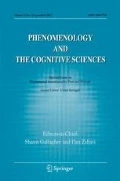Abstract
Phenomenal consciousness, what it is like to have or undergo an experience, is typically understood as an empirical item – an actual or possible object of consciousness. Accordingly, the problem posed by phenomenal consciousness for materialist accounts of the mind is usually understood as an empirical problem: a problem of showing how one sort of empirical item – a conscious state – is produced or constituted by another – a neural process. The development of this problem, therefore, has usually consisted in the articulation of an intuition: no matter how much we know about the brain, this will not allow us to see how it produces or constitutes phenomenal consciousness. Developing a theme first explored by Kant, and then later by Sartre, this paper argues that the real problem posed by phenomenal consciousness is quite different. Consciousness, it will be argued, is not an empirical but a transcendental feature of the world. That is, what it is like to have an experience is not something of which we are aware in the having of that experience, but an item in virtue of which the genuine (non-phenomenal) objects of our consciousness are revealed as being the way they are. Phenomenal consciousness, that is, is not an empirical object of awareness but a transcendental condition of the possibility of there being empirical objects of awareness.
Similar content being viewed by others
References
Dretske, F. 1993. Conscious experience. Mind 102: 263-283.
Jackson, F. 1982. Epiphenomenal Qualia. Philosophical Quarterly 32: 127-132.
Jackson, F. 1986. What Mary didn't know. Journal of Philosophy 83: 291-295.
Levine, J. 1983. Materialism and qualia: the explanatory gap. Pacific Philosophical Quarterly 64: 354-361.
Kant, I. 1929. The Critique of Pure Reason A edition 1781 + B edition 1787, trans Norman Kemp Smith. London: Macmillan Press.
Martin, M. G. F. The transparency of experience. Unpublished manuscript.
McGinn, C. 1991. The Problem of Consciousness. Oxford: Blackwell.
Moore, G. E. 1903. The refutation of idealism. Mind 12: 433-453.
Rowlands, M. 2001. The Nature of Consciousness. Cambridge: Cambridge University Press.
Sartre, J.-P. 1971. The Transcendence of the Ego, trans. F. Williams and R. Kirkpatrick. New York: Noonday Press.
Sartre, J.-P. 1995. Being and Nothingness, trans. H. Barnes. London: Routledge.
Author information
Authors and Affiliations
Rights and permissions
About this article
Cite this article
Rowlands, M. Consciousness: The transcendentalist manifesto. Phenomenology and the Cognitive Sciences 2, 205–221 (2003). https://doi.org/10.1023/B:PHEN.0000004925.72401.ce
Issue Date:
DOI: https://doi.org/10.1023/B:PHEN.0000004925.72401.ce




